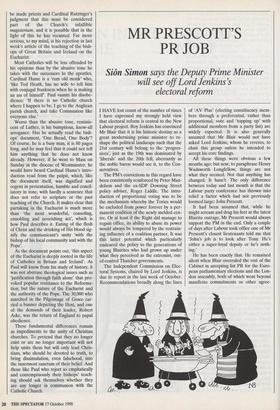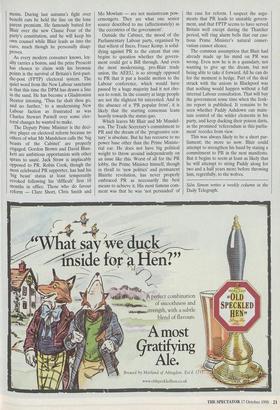MR PRESCOTT'S PR JOB
I HAVE lost count of the number of times I have expressed my strongly held view that electoral reform is central to the New Labour project. Roy Jenkins has convinced Mr Blair that it is his historic destiny as a great modernising prime minister to re- shape the political landscape such that the 21st century will belong to the 'progres- sives', just as the 19th was dominated by `liberals' and the 20th fell, aberrantly as the noble baron would see it, to the Con- servatives.
The PM's convictions in this regard have been consistently reinforced by Peter Man- delson and the ex-SDP Downing Street policy adviser, Roger Liddle. The intro- duction of proportional voting was to be the mechanism whereby the Tories would be excluded from power forever by a per- manent coalition of the newly melded cen- tre. Or at least if the Right did manage to regain office, its ability to abuse its power would always be tempered by the restrain- ing influence of a coalition partner. It was this latter potential which particularly endeared the policy to the generations of young Blairites who had grown up under what they perceived as the extremist, out- of-control Thatcher governments.
The Independent Commission on Elec- toral Systems, chaired by Lord Jenkins, is due to report in the last week of October. Recommendations broadly along the lines of 'AV Plus' (electing constituency mem- bers through a preferential, rather than proportional, vote and 'topping up' with additional members from a party list) arc widely expected. It is also generally assumed that Mr Blair would not have asked Lord Jenkins, whom he reveres, to chair this group unless he intended to accept his core findings.
All these things were obvious a few months ago; but now, to paraphrase Henry Wadsworth Longfellow, things are not what they seemed. Not that anything has changed. It hasn't. The only difference between today and last month is that the Labour party conference has thrown into relief a factor which had not previously loomed large: John Prescott.
It had been assumed that, while he might scream and drag his feet at the latest Blairite outrage, Mr Prescott would always support the PM in the end. Only a couple of days after Labour took office one of Mr Prescott's closest lieutenants told me that `John's job is to look after Tony. He's either a super-loyal deputy or he's noth- ing.'
He has been exactly that. He remained silent when Blair overruled the rest of the Cabinet in accepting list PR for the Euro- pean parliamentary elections and the Lon- don assembly, both of which went beyond manifesto commitments or other agree- ments. During last autumn's fight over benefit cuts he held the line on the lone parent premium. He famously batted for Blair over the new Clause Four of the Party's constitution, and he will keep his own counsel while Blair leads us into the euro, much though he personally disap- proves.
As every modern consumer knows, loy- alty carries a bonus, and the prize Prescott has chosen to claim with his brownie points is the survival of Britain's first-past- the-post (FPTP) electoral system. The quiet word from the New Labour sanctums is that this time the DPM has drawn a line in the sand. He has become a Gladstonian Stentor intoning, 'Thus far shalt thou go, and no further,' to a modernising New Labour faction as frustrated as was Charles Stewart Parnell over some elec- toral changes he wanted to make. The Deputy Prime Minister is the deci- sive player on electoral reform because no others of what Mr Mandelson calls the 'big beasts of the Cabinet' are properly engaged. Gordon Brown and David Blun- kett are ambitious opportunists with other sprats to sauté. Jack Straw is implacably opposed to PR. Robin Cook, though the most celebrated PR supporter, has had his `big beast' status at least temporarily revoked following his 'difficult' first 18 months in office. Those who do favour reform — Clare Short, Chris Smith and Mo Mowlam — are not mainstream pow- ermongers. They are what one senior source described to me (affectionately) as `the eccentrics of the government'.
Outside the Cabinet, the mood of the Parliamentary Labour party, organised by that wiliest of fixers, Fraser Kemp, is solid- ifying against PR to the extent that one begins to question whether the govern- ment could get a Bill through. And even the most modernising, pro-Blair trade union, the AEEU, is so strongly opposed to PR that it put a hostile motion to the Labour conference, which would have passed by a huge majority had it not cho- sen to remit. In the country at large people are not the slightest bit interested. And in the absence of a 'PR popular front', it is likely that the starting consensus leans heavily towards the status quo.
Which leaves Mr Blair and Mr Mandel- son. The Trade Secretary's commitment to PR and the dream of the 'progressive cen- tury' is absolute. But he has recourse to no power base other than the Prime Ministe- rial ear. He does not have big political weight to throw around independently on an issue like this. Worst of all for the PR lobby, the Prime Minister himself, though in thrall to 'new politics' and permanent Blairite revolution, has never properly embraced PR as necessarily the best means to achieve it. His most famous com- ment was that he was 'not persuaded' of the case for reform. I suspect the argu- ments that PR leads to unstable govern- ment, and that FPTP seems to have served Britain well except during the Thatcher period, will ring alarm bells that our cau- tious Prime Minister's natural conser- vatism cannot silence.
The common assumption that Blair had already made up his mind on PR was wrong. Even now he is in a quandary, not wanting to give up the dream, but not being able to take it forward. All he can do for the moment is hedge. Part of the deal struck with the unions in Blackpool was that nothing would happen without a full internal Labour consultation. That will buy the government some time when the Jenk- ins report is published. It remains to be seen whether Paddy Ashdown can main- tain control of the wilder elements in his party, and keep ducking their poison darts, as the promised 'referendum in this parlia- ment' recedes from view.
This was always likely to be a short par- liament; the more so now. Blair could attempt to strengthen his hand by stating a commitment to PR in the next manifesto. But it begins to seem at least as likely that he will attempt to string Paddy along for two and a half years more before throwing him, regretfully, to the wolves.
Sion Simon writes a weekly column in the Daily Telegraph.











































































 Previous page
Previous page